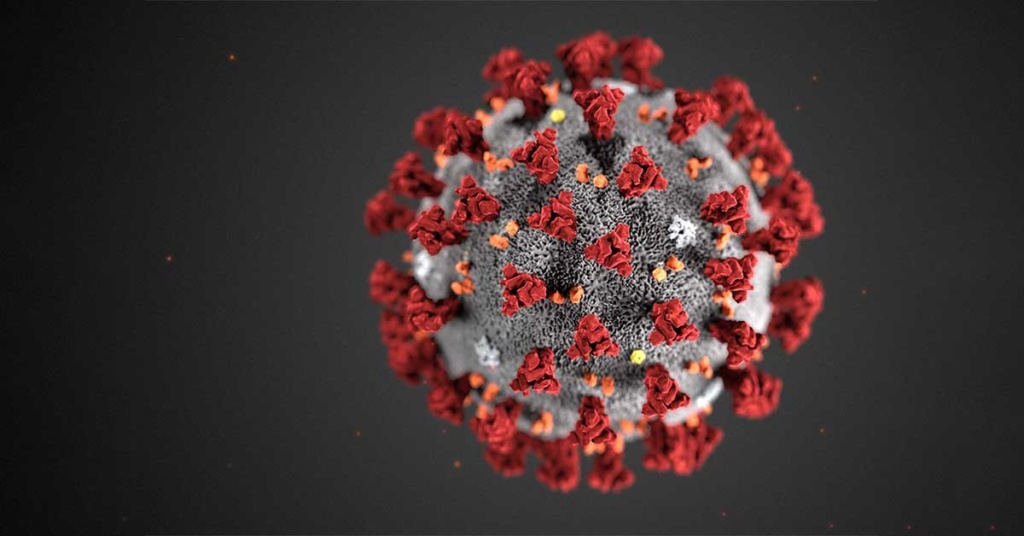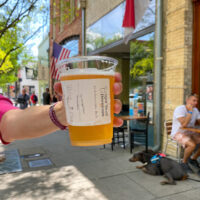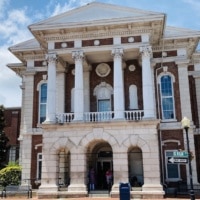Gov. Andy Beshear has moved up the date for Kentucky to begin the second phase of its reopening, announcing Thursday that Kentucky’s restaurants can reopen May 22 at one-third capacity. He also set a goal of limited child care on June 15.

He said restaurants will be allowed unlimited outdoor seating as long as they keep tables 6 feet apart, the standard social-distance guideline.
“I know this isn’t the capacity that our restaurants probably want, but the studies that we look at show that we’ve got to be rally careful about this step,” Beshear said at his daily briefing. “This allows it to be open for Memorial Day weekend, but please be careful. … This is the best compromise between public health and making sure we can restart this part of the economy.”
Beshear has been under pressure from Kentucky restaurants, especially in Louisville, because Indiana has allowed its restaurants to reopen. He noted that Indiana and Tennessee have reopened restaurants, but said he was driven by conversations with Ohio Gov. Mike DeWine. Ohio will open its restaurants before Kentucky does, and that would likely have brought the same sort of complaints from Northern Kentucky that have been heard in Louisville.
“We had planned it for a little bit later, but I think that this is partial harm reduction and also the belief that those that we have worked with sincerely want to do this right and only want to re-open if they can do it right,” Beshear said. “Many will find that they won’t be ready for that date. Don’t rush.”
He added that it’s important for restaurants to meet their industry-specific guidance, which will be forthcoming, and the 10 state requirements for opening, including such things as thorough, repeated cleaning; mask-wearing; taking on-site temperature checks of employees; making sure there is adequate hand cleaning access; and having a testing plan for employees with elevated temperatures.
“These aren’t easy,” Beshear said, adding later, “If we’re gonna do this, we’re gonna do it safe.”
Beshear also announced that movie theaters and fitness centers will be able to reopen June 1, campgrounds will be able to reopen June 11, and some child care with reduced capacity and potentially low-touch, outdoor youth sports on June 15. But he said that wasn’t guaranteed.
“This is a goal, a goal, we are pushing for,” he said. “We want to have a safe plan for child care, knowing that it is such a challenge for folks. I will tell you that it will be significantly reduced capacity and it will be very monitored to make sure that it’s safe.”
The gradual reopening of businesses that will begin Monday has increased calls to reopen child-care centers, but Beshear has said that would be risky. Unemployed people who get called back to work but can’t find child care will be allowed to keep getting unemployment benefits.
Beshear said bars and groups of 50 or more people may be able to open in July. Groups of 10 or fewer will be able to gather on May 25.
Beshear is accelerating his reopening of the state’s economy, even though Kentucky hasn’t met the benchmarks that he laid out about three weeks ago, Joe Sonka reports for the Louisville Courier Journal, weaving together several threads pursued by Kentucky Health News and the Lexington Herald-Leader in the last two weeks, and providing more research and analysis.
“COVID-19 cases are not declining, testing capacity still lags behind the White House’s recommendation and 500 new workers to conduct contact tracing are possibly weeks away from starting,” Sonka notes, then digs into each of these measures in detail, adding two analyses that question whether Kentucky is jumping the gun: a Bloomberg analysis and a recent study by the Louisville Metro Department of Public Health & Wellness and the University of Louisville.
The study concludes that if Louisville was able to “practice stronger social-distancing strategies, we could safely open in early June. Therefore, taking new and more effective measures can make a manageable early-June opening more likely.” It said “decreasing the current social-distancing measures without efforts in regard to testing, isolating, and contact tracing can move us to an unstable status which can be catastrophic.”
Dr. Paul McKinney, director of U of L’s Center for Health Hazards Preparedness and co-author of the study, told Sonka that Beshear’s reopening plan likely isn’t perfect, “but it’s a very reasonable plan, I think, to do it in steps. … The good thing about the staged plan is that if you find we’re going too fast, you put the brakes on there. Rather than saying ‘We’re closing everything down again,’ no, ‘We’re just stopping where we are and not moving any further’.”
Beshear said Thursday, “Our goal in having a gradual plan is to be able to pause. And that would be our first step. If we saw a spike, we would pause where we are. We would look at where we’ve seen them, what type of businesses that we have; we would try to be surgical on those areas.”
The governor says another reason the state can start reopening is it will have the capacity to test 2 percent of its population each month, as federal guidelines call for.
Beshear spent a fair amount of time discussing the state’s increased capacity for testing, noting that it would soon be able to do 30,000 a week. To date the state has only tested 81,391 people, which he said was likely a low number since some labs have not been reporting their negative results.
He also announced a new partnership with First Care Clinics, which can now provide COVID-19 tests at 13 locations, seven days a week across the state, at no cost to employees or their employers.
“We’ve been working hard on a solution with the private sector that will significantly increase our testing capacity at the time people return to work, and return to worship,” Beshear said. “Our vision for this partnership with First Care is that it becomes the place folks go to get a test if they’re going back into work.”
In addition to the increased testing capacity, Beshear said the state is ready to start reopening its economy because there has been no growth in new cases and because opening the state is opening gradually, which will allow him to pause if needed.
Beshear’s office said someone made a mistake by releasing a prison inmate before knowing the result of his coronavirus test, which turned out to be positive. Now Michael Gene Welch, who has no symptoms. is back at the Green River Correctional Complex for at least weeks — until he can test negative for the virus twice in at least 24 hours, reports John Cheves of the Herald-Leader.
Welch’s fiance, who picked him up and “spent hours in confined spaces with him Tuesday before returning home to her family — including her 84-year-old mother — wants to know how this went wrong,” Cheves writes. Beshear spokeswoman Crystal Staley told him, “We are investigating the circumstances that led up to the release and will take any and all appropriate action.”






